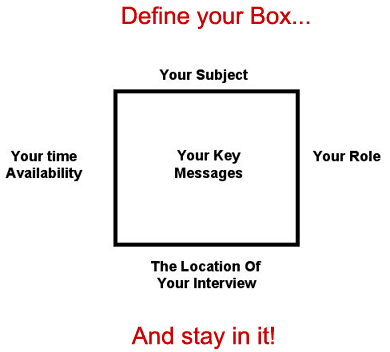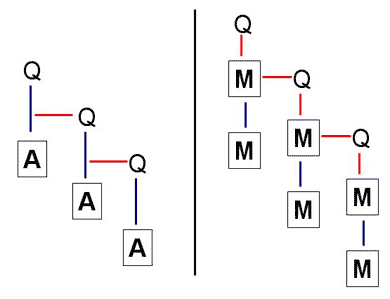Learning Objectives
Primary
- Understand contemporary Canadian media.
- How to maximize opportunities in working with the media.
- How to minimize the risks in working with the media.
- How to control media interviews.
Secondary
- To rehearse key messages and answers to difficult questions.
Media Basics
- Contemporary Media
- Media Opportunities
- Media Risks
- Control
- Managing the Interview
- Key Messages
- Answering Questions
- Do’s
- Don’ts
Contemporary Media
Characteristics
- Highly influential
- Overworked, underpaid, under pressure
- Focused on social issues, politics
- Lack knowledge of business, technology, science
- Have a pack mentality
- Looking to inform and entertain
- See everything in black and white
- Looking for different sides of a story
Information Sources
- Their own files
- Other media reports
- On-line data bases
- Governments
- Industry associations
- Employees
- Neighbors
- Customers
- Suppliers
- Competitors
Media Opportunities
- Two to ten inches
- Can be read many times
- High credibility
- Easily reproduced i.e. clippings
- Permits detailed description
- Variable audience size
Television
- Fifteen to ninety seconds
- Seen once, except re-broadcast
- High credibility
- Easily reproduced (less convenient)
- Picture worth a 1000 words
- Verbal descriptions – less detail
- Mass audience
Radio
- Ten to thirty seconds
- Heard once
- Easily reproduced
- A headline service
- Smaller audience
Media Risks
Interview Styles
- Comedian
- Interrogator
- Machine Gunner
- Interrupter
- Paraphraser
- Pal
Reporter
- Ignorance
- Skill
- Attitude
- Editorial bias
- Poor preparation
Spokesperson
- Lapsing into conversation
- Ignorance
- Nervousness
- Attitude
- Poor preparation
- Tape recorders
Media Control
Content
An unmanaged interview (a casual conversation)
- Ten different questions.
- Ten different answers.
A managed interview (a business meeting)
- Ten different questions.
- Two or three consistent answers.
Only you have 100% control of what you say!
The media relations process
GOOD NEWS
Objectives
- Enhance corporate/brand reputation
- Positive management profile
- Reach a broad audience
- Sustain media interest
- Get key messages out
- Take control of the story
BAD NEWS
Objectives
- Protect corporate/brand reputation
- Protect management profile
- Confine reach, duration
- Minimize media interest
- Get key messages out
- Take control of the story
GOOD NEWS
Tactics
- Key messages
- Q&A
- Media Kit
- B-roll (B-rolls are broadcast quality, professionally shot
video clips), stock photos - Photo ops
- Train spokespeople
- Media advisory
- Media releases
- Follow-up calls
- News conferences
- Special Events
- One-on-one interviews
- Monitor coverage
BAD NEWS
Tactics
- Key messages
- Q&A
- Media Kit
- B-roll, stock photos
- Stand-by statement
- Train spokespeople
- Media releases
- Regular bulletins/briefings
- News conferences
- Special Events
- One-on-one interviews
- Monitor coverage
- Correct rumours
Screening Questions
- What is the reporters name, phone and fax numbers?
- What is the subject of the interview and which specific angles will the reporter be exploring?
- What is the real deadline?
- Will the interview be live or taped?
- How long will the interview last and where will it be conducted? (to be negotiated.)
- Where will the article appear: news, lifestyle, sports, etc.?
- When will it be broadcast or published?
- Who is the audience or reader?
- Who else will the reporter be talking to?
- Can I help you ensure accuracy before it is published/broadcast?
Managing the Interview

Your Rights and Options
- Accept/Refuse
- Win
- Draw
- Lose
- Maintain a relationship
Duration
- Time Frame
- Graceful ending
Location
- Office
- Plant
- Store
- Outside
- Inside
- Across the table
Re-ask
- Multiple takes
Dress
- Business Attire
- Shirt/Blouse
- Casual
Posture
- Standing
- Sitting
Key Messages
Ask yourself, What do I want them to remember?
- Fewer than twenty words.
- No more than five messages.
- Simple Words
- Punchy appropriate phrasing.
- Interesting, different, unique – newsworthy.
- Support with clear simple examples.
Answering questions

Position
- State your key message up front.
Evidence
- Simple examples, meaningful to your audience.
- Stress the benefits, local angles, accentuate the positive.
Summary
- Restate your key message.
Use Transitional Phrases
- Your readers would be interested to know
- Thats an interesting question; let me remind you though
- Before I forget, I wan to tell your audience
- Let me put that in perspective
- Whats important to remember, however
- What I really want to talk to you about is
- Whats most important is
- And dont forget
- Before we get off that subject/topic let me add
- Thats no my area of expertise but what I can tell you is
- What Im really here to talk to you about is
- Let me just add…
Use Transitional Phrases
- Thats a good point…I think your audience would be interested in knowing that
- That reminds me
- Let me answer you by saying that
- Let me give you some background information
- Lets take a closer look at
- Thats an important point because
- What that means is
- Another thing to remember is
- Now that youve covered, lets move on to
- You may be asking why is true
- Whileis certainly important, dont forget that
- As I said…
Remember to…
- Prepare messages and answers in advance, know your story, rehearse.
- Research the opportunity beforehand.
- Dress appropriately and arrive early.
- Understand your rights.
- Give your business card and info kit to reporters – fax key messages after a phone interview.
- Ask for the reporters business card.
- Treat each interview as special – as an opportunity.
- Respect a reporters deadline and be responsive.
- Be yourself, be honest.
- Stay calm in an interview, watch your demeanor.
- Stick to your key messages and keep it simple.
- Establish business relationships with reporters, and media outlets.
- Be confident – you are the expert.
- Mention the name of your organization or its products if the story is positive.
Remember NOT to…
- Use jargon.
- Feel obligated or pressured.
- Guess, speculate or comment on rumors.
- Assume anything.
- Say, no comment.
- Repeat a negative.
- Use sarcasm.
- Speak off-the-record.
- Let a reporter put words in your mouth.
- Speak on behalf of other organizations.
- Express a personal view.
- Mention the name of your organization or its products if the story is negative.
Media Skills Summary
- Interviews are business meetings.
- Know and deliver your key messages.
- Practice and prepare.
- Understand your rights.
- Accentuate the positive.
- Maintain control of the interview.